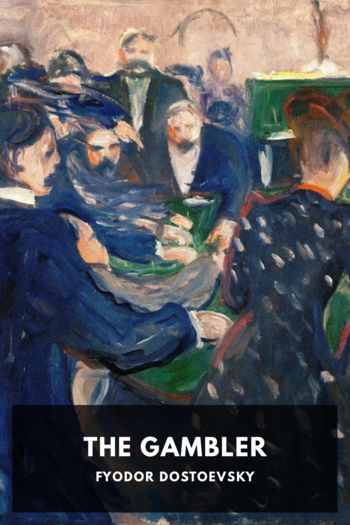Notes from Underground by Fyodor Dostoevsky (best black authors .txt) 📕

- Author: Fyodor Dostoevsky
Book online «Notes from Underground by Fyodor Dostoevsky (best black authors .txt) 📕». Author Fyodor Dostoevsky
As though such a stone wall really were a consolation, and really did contain some word of conciliation, simply because it is as true as twice two makes four. Oh, absurdity of absurdities! How much better it is to understand it all, to recognise it all, all the impossibilities and the stone wall; not to be reconciled to one of those impossibilities and stone walls if it disgusts you to be reconciled to it; by the way of the most inevitable, logical combinations to reach the most revolting conclusions on the everlasting theme, that even for the stone wall you are yourself somehow to blame, though again it is as clear as day you are not to blame in the least, and therefore grinding your teeth in silent impotence to sink into luxurious inertia, brooding on the fact that there is no one even for you to feel vindictive against, that you have not, and perhaps never will have, an object for your spite, that it is a sleight of hand, a bit of juggling, a cardsharper’s trick, that it is simply a mess, no knowing what and no knowing who, but in spite of all these uncertainties and jugglings, still there is an ache in you, and the more you do not know, the worse the ache.
IV“Ha, ha, ha! You will be finding enjoyment in toothache next,” you cry, with a laugh.
“Well, even in toothache there is enjoyment,” I answer. I had toothache for a whole month and I know there is. In that case, of course, people are not spiteful in silence, but moan; but they are not candid moans, they are malignant moans, and the malignancy is the whole point. The enjoyment of the sufferer finds expression in those moans; if he did not feel enjoyment in them he would not moan. It is a good example, gentlemen, and I will develop it. Those moans express in the first place all the aimlessness of your pain, which is so humiliating to your consciousness; the whole legal system of nature on which you spit disdainfully, of course, but from which you suffer all the same while she does not. They express the consciousness that you have no enemy to punish, but that you have pain; the consciousness that in spite of all possible Wagenheims you are in complete slavery to your teeth; that if someone wishes it, your teeth will leave off aching, and if he does not, they will go on aching another three months; and that finally if you are still contumacious and still protest, all that is left you for your own gratification is to thrash yourself or beat your wall with your fist as hard as you can, and absolutely nothing more. Well, these mortal insults, these jeers on the part of someone unknown, end at last in an enjoyment which sometimes reaches the highest degree of voluptuousness. I ask you, gentlemen, listen sometimes to the moans of an educated man of the nineteenth century suffering from toothache, on the second or third day of the attack, when he is beginning to moan, not as he moaned on the first day, that is, not simply because he has toothache, not just as any coarse peasant, but as a man affected by progress and European civilisation, a man who is “divorced from the soil and the national elements,” as they express it nowadays. His moans become nasty, disgustingly malignant, and go on for whole days and nights. And of course he knows himself that he is doing himself no sort of good with his moans; he knows better than anyone that he is only lacerating and harassing himself and others for nothing; he knows that even the audience before whom he is making his efforts, and his whole family, listen to him with loathing, do not put a ha’porth of faith in him, and inwardly understand that he might moan differently, more simply, without trills and flourishes, and that he is only amusing himself like that from ill-humour, from malignancy. Well, in all these recognitions and disgraces it is that there lies a voluptuous pleasure. As though he would say: “I am worrying you, I am lacerating your hearts, I am keeping everyone in the house awake. Well, stay awake then, you, too, feel every minute that I have toothache. I am not a hero to you now, as I tried to seem before, but simply a nasty person, an impostor. Well, so be it, then! I am very glad that you see through me. It is nasty for you to hear my despicable moans: well, let it be nasty; here I will let you have a nastier flourish in a minute. …” You do not understand even now, gentlemen? No, it seems our development and our consciousness must go further to understand all the intricacies of this pleasure. You laugh? Delighted. My jests, gentlemen, are of course in bad taste, jerky, involved, lacking self-confidence. But of course that is because I do not respect myself. Can a man of perception respect himself at all?
VCome, can a man who attempts to find enjoyment in the very feeling of his own degradation possibly have a spark of respect for himself? I am not saying this now from any mawkish kind of remorse. And, indeed, I could never endure saying, “Forgive me, Papa, I won’t do it again,” not because I am incapable of saying that—on the contrary, perhaps just because I have been too capable of it, and in what a way, too. As though of design I used to get into trouble in cases when I was not to blame in any way. That was the nastiest part of it. At the same time I was genuinely touched and penitent, I used to shed tears and, of course, deceived myself, though





Comments (0)